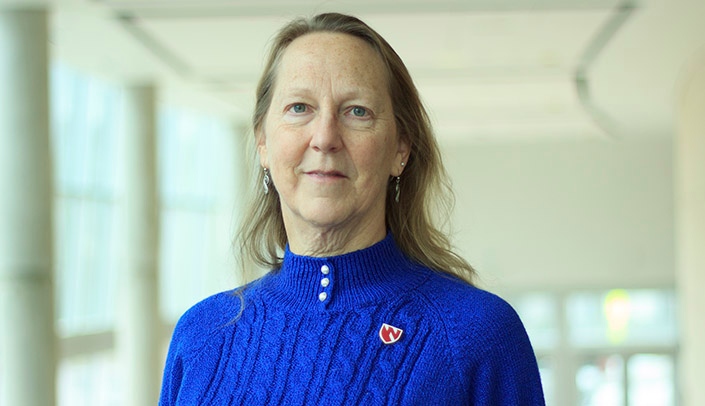Nancy Krusen, Ph.D., founding director of occupational therapy education, in the College of Allied Health Professions, didn’t have far to look to find her profession. You might say she inherited it.
Both of her parents were physiatrists — physicians that specialize in physical medicine and rehabilitation (UNMC created a PM&R department, then a PM&R residency program, in 2016 and 2017).
As a young girl, Dr. Krusen would accompany her mom, asking questions, interacting with patients. Even then, people said she’d make a great occupational therapist.
“I seem to have the gift of seeing the person rather than the disability,” she said.
Now she’s come to UNMC to launch the CAHP’s new Occupational Therapy Doctorate (OTD) program. Occupational therapy is a fast-growing profession, with a lot of opportunity — and a lot of need. Thirty-two Nebraska counties have been designated as occupational therapy shortage areas.
The formal process to obtain accreditation for the program is well underway. Occupational therapy is experiencing rapid growth in new programs nationally, and the accrediting body limits the review of new programs to 18 a year. As a result, UNMC anticipates enrolling its first class of OTD students as early as fall 2021, and no later than fall 2022.
UNMC aims to enroll 42-46 students annually in the three-year, 116-credit hour program. UNMC would educate occupational therapy students at its Omaha campus and at the Health Science Education Complex on the University of Nebraska at Kearney campus.
Occupational therapy complements physical therapy. Physical therapists are movement experts who optimize quality of life through prescribed exercise, hands-on care, and patient education. Occupational therapy uses daily life activities to support people with cognitive, emotional or physical concerns. “Occupational therapy addresses the things people need and want to do,” Dr. Krusen said.
Occupational therapists help patients develop, regain and improve skills needed to participate in activities of daily living, and function more effectively in home, work and social activities. In other words, “occupational” in the sense of how you occupy your time.
Dr. Krusen comes to UNMC from Pacific University in Oregon, where she was professor of occupational therapy, and instrumental in developing an interprofessional Ph.D. in education and leadership.
It was an emphasis on collaborative interprofessionalism that first piqued her interest in UNMC. She’d followed from afar UNMC’s efforts with the Interprofessional Academy of Educators, iEXCEL and the construction of the Davis Global Center.
Kyle Meyer, Ph.D., dean of the college, could not be more pleased to have recruited Dr. Krusen. “She is absolutely the right person at the right time to establish the first OTD program at UNMC and at a public institution in Nebraska,” Dr. Meyer said. “With Dr. Krusen’s vast experience in occupational therapy education, I have no doubt we are on a trajectory to develop an outstanding program.”
Dr. Krusen said she lives occupational balance as well as teaches it. Hiking and snowshoeing get her brain working, as well as her body. She also enjoys creating a sense of community, cooking and sharing meals with family and friends.
